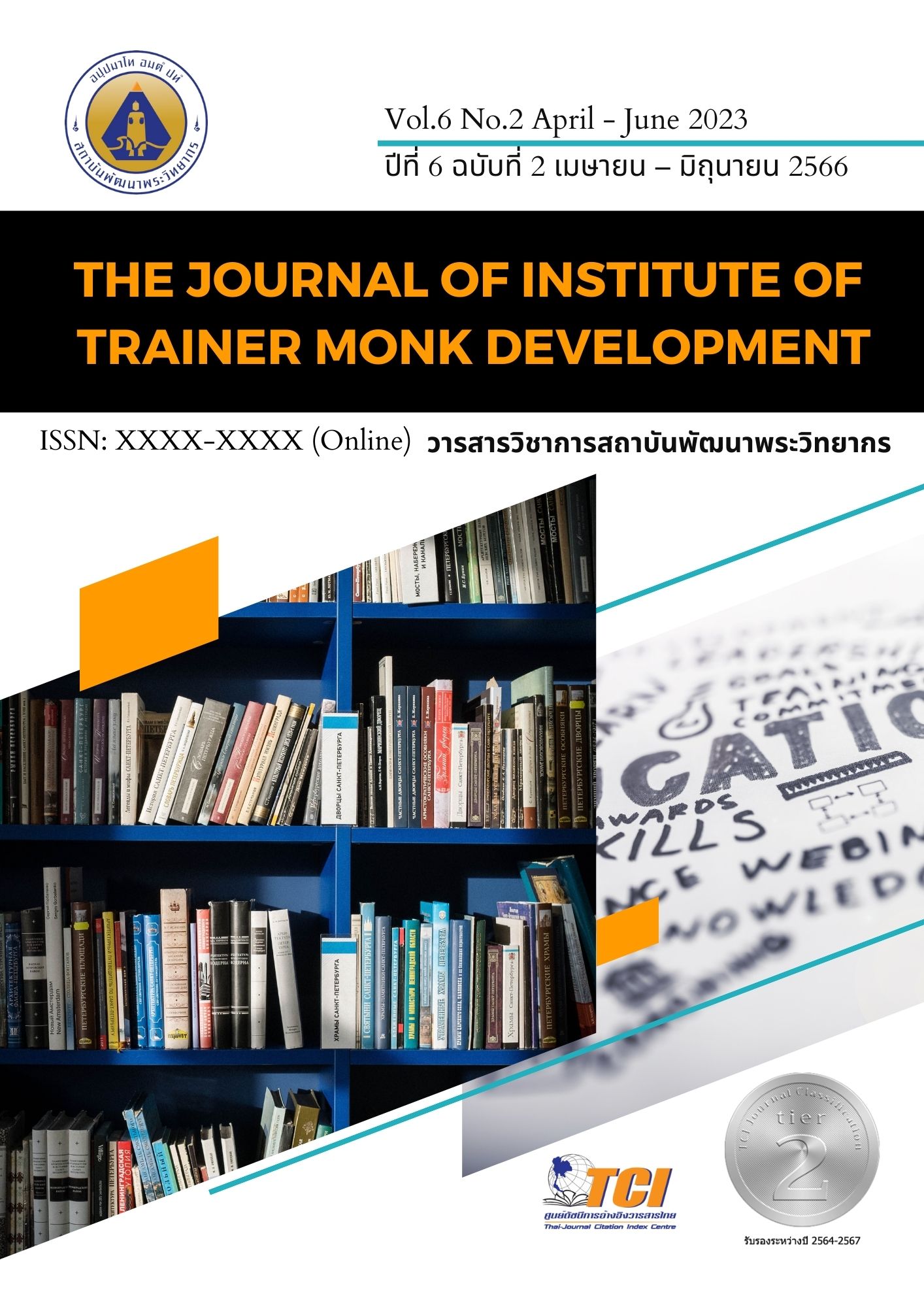การประยุกต์ใช้หลักไตรสิกขาเพื่อพัฒนาการเรียนรู้ของเยาวชน กรณีศึกษา: โรงเรียนคลองบางพรหม กรุงเทพมหานคร
Main Article Content
บทคัดย่อ
งานวิจัยรื่องมีวัตถุประสงค์ 3 ประการ 1) เพื่อศึกษาการประยุกต์ใช้หลักไตรสิกขาเพื่อพัฒนาการเรียนรู้ของเยาวชน 2) เพื่อศึกษาความสัมพันธ์ระหว่างปัจจัยส่วนบุคคล กับการประยุกต์ใช้หลักไตรสิกขาเพื่อพัฒนาการเรียนรู้ของเยาวชน กรณีศึกษา: โรงเรียนคลองบางพรหม กรุงเทพมหานคร และ 3) เพื่อเสนอแนะแนวทางการประยุกต์ใช้หลักไตรสิกขาเพื่อพัฒนาการเรียนรู้ของเยาวชน กรณีศึกษา: โรงเรียนคลองบางพรหม กรุงเทพมหานคร ศึกษาวิจัยโดยใช้ระเบียบวิธีการวิจัยเชิงปริมาณ ที่เก็บรวบรวมข้อมูลโดยใช้แบบสอบถาม โดยมีกลุ่มตัวอย่างจำนวน 169 คน เครื่องมือที่ใช้เป็นแบบสอบถาม มีลักษณะเป็นแบบตรวจสอบรายการและมาตราส่วนประเมินค่า 5 ระดับแบบสอบถามปลายเปิด และแบบสัมภาษณ์ สถิติ ค่าความถี่ ค่าร้อยละ ค่าเฉลี่ย ส่วนเบี่ยงเบนมาตรฐาน ใช้การทดสอบด้วยค่าสถิติไคสแควร์ () โดยใช้ระดับนัยสำคัญทางสถิติที่ระดับ 0.05 ผลการศึกษาพบว่า 1) การประยุกต์ใช้หลักไตรสิกขาเพื่อพัฒนาการเรียนรู้ของเยาวชนกรณีศึกษา: โรงเรียนคลองบางพรหม กรุงเทพมหานคร โดยรวมอยู่ในระดับมาก และเมื่อพิจารณารายละเอียดแต่ละด้าน พบว่า ด้านหลักการประยุกต์ใช้ความรู้อยู่ในระดับสูงสุด รองลงมา คือ ด้านหลักการเรียนรู้กระบวนการ และด้านหลักการมีส่วนร่วมทางร่างกายอยู่ในระดับน้อยที่สุด 2) ผลการหาค่าความสัมพันธ์การประยุกต์ใช้หลักไตรสิกขาเพื่อพัฒนาการเรียนรู้ของเยาวชนโรงเรียนคลองบางพรหม กรุงเทพมหานคร พบว่า ตั้งแต่สมมติฐานที่ 1-5 นักเรียนไม่มีความสัมพันธ์กับการประยุกต์ใช้หลักไตรสิกขาเพื่อพัฒนาการเรียนรู้ของเยาวชนกรณีศึกษา: โรงเรียนคลองบางพรหม กรุงเทพมหานคร ซึ่งปฏิเสธสมมติฐานที่ตั้งไว้ 3) สภาพปัญหาเกี่ยวกับการหาค่าความสัมพันธ์การประยุกต์ใช้หลักไตรสิกขาเพื่อพัฒนาการเรียนรู้ของเยาวชนกรณีศึกษา: โรงเรียนคลองบางพรหม กรุงเทพมหานคร พบว่า นักเรียนไม่เข้าใจวิธีการสร้างความรู้เกี่ยวกับไตรสิกขา การแสดงความคิดเห็นของนักเรียนแต่ละคนต่างกัน และข้อเสนอแนะ คือ เน้นการสอนผู้เรียนด้วยวิธีการสร้างความรู้เกี่ยวกับไตรสิกขาให้มากขึ้น ผู้สอนต้องให้ผู้เรียนเน้นการแสดงความคิดเห็นออกมาเพื่อแสดงความกล้าคิดกล้าแสดงออก
Article Details

อนุญาตภายใต้เงื่อนไข Creative Commons Attribution-NonCommercial-NoDerivatives 4.0 International License.
บทความที่ได้รับการตีพิมพ์เป็นลิขสิทธิ์ของวารสารวิชาการสถาบันพัฒนาพระวิทยากร
ข้อความที่ปรากฎอยู่ในบทความที่ได้รับการตีพิมพ์ในวารสาร ถือเป็นความรับผิดชอบของผู้เขียนบทความ และข้อคิดเห็นนั้นไม่ถือว่าเป็นทัศนะและความรับผิดชอบของกองบรรณาธิการวารสารวิชาการสถาบันพัฒนาพระวิทยากร
เอกสารอ้างอิง
กรมการศาสนา กระทรวงวัฒนธรรม. (2549). คู่มือการดําเนินงานตามโครงการพระสอนศีลธรรมในโรงเรียน ปีงบประมาณ 2549. กรุงเทพมหานคร: โรงพิมพ์องค์การรับส่งสินค้าและพัสดุภัณฑ์ ร.ส.พ.
กระทรวงศึกษาธิการ. (2547). แนวทางการดำเนินงานโรงเรียนวิถีพุทธ. กรุงเทพมหานคร: สำนักพัฒนานวัตกรรมการจัดการศึกษา.
พระราชบัญญัติการศึกษาแห่งชาติ พ.ศ. 2542. (2542, 19 สิงหาคม). ราชกิจจานุเบกษา เล่ม 116 ตอนที่ 74 ก.
พระพรหมคุณาภรณ์. (2549). สุขภาวะองค์รวมแนวพุทธ. (พิมพ์ครั้งที่ 12). กรุงเทพมหานคร: โรงพิมพ์อักษรสัมพันธ์ จำกัด.
พระมหากำพล คุณงฺกโร. (2553). “ศึกษาบทบาทของพระสงฆ์ในการอบรมจริยธรรมแก่เยาวชนในอำเภอบางกรวย จังหวัดนนทบุรี”. วิทยานิพนธ์พุทธศาสตรมหาบัณฑิต สาขาวิชาการจัดการเชิงพุทธ. บัณฑิตวิทยาลัย: มหาวิทยาลัยมหาจุฬาลงกรณราชวิทยาลัย.
พระจิรวัฒน์ อุตฺตมเมธี (วุฒิพงศ์). (2555). “ศึกษาวิเคราะห์การศึกษาเพื่อพัฒนาตนตามทัศนะของพระพรหมคุณาภรณ์ (ป.อ. ปยุตฺโต). วิทยานิพนธ์พุทธศาสตรมหาบัณฑิต. บัณฑิตวิทยาลัย: มหาวิทยาลัยมหาจุฬาลงกรณราชวิทยาลัย.
วิชิต สงวนไกรพงษ์. (2557). พัฒนาการเรียนรู้ตามหลักไตรสิกขาในพระพุทธศาสนาเถรวาท. ดุษฎีนิพนธ์พุทธศาสตรดุษฎีบัณฑิต สาขาวิชาพระพุทธศาสนา. บัณฑิตวิทยาลัย: มหาวิทยาลัยมหาจุฬาลงกรณราชวิทยาลัย.


